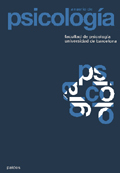Cognitive-behavioural treatment in Mexican children with social phobia
Abstract
Seventeen children with social phobia, 7 to 12 years of age, were randomly assigned to three conditions: (a) children exposed to “Intervención en Adolescentes con Fobia Social” (Olivares, 2005), (b) a combination of the aforementioned protocol applied to children and information about the disorder provided to their parents, and (c) waiting list control. Measurements of the children’s symptoms of social phobia were carried out and their depression/anxiety and social problems reported by their parents, in pre- and post-test assessments as well as 3 and 6 months after treatment. Improvement was observed after treatment in all children exposed to the intervention, but not those on the waiting list. No improvement was observed due to the parents’ participation. The results of previous studies on the efficacy of cognitive behavioural treatments were replicated in Mexican children. Key words: children, social phobia, treatment, IAFS Program, follow-up, replica, experimental.Downloads
Published
2009-07-02
Issue
Section
Dossier: Fobia social en la infancia y la adolescencia en Iberoamérica (Coordina: José Olivares)
License
The authors who publish in this journal agree to the following terms:
Authors transfer to the publisher all copyright for the full term of protection and for all the world.
The authors can post a copy of their articles in accordance with the policy of free access to the journal.


